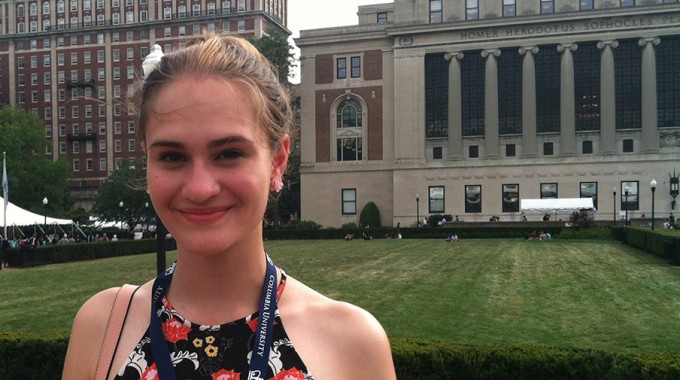If you know of a Columbia College student, faculty member, alumnus/alumna or program we should spotlight, or if you would like to submit a story, please contact:
Columbia College
Office of Communications
cc-comms@columbia.edu

“Thanks to Columbia’s Work Exemption Program, I have been able to do groundbreaking work and explore the limits of my intellectual capabilities while researching the boundaries of the known universe.” —Francesca Jarrett CC’19
Thanks to Columbia’s Work Exemption Program, which is designed to enable financial aid recipients to take advantage of unpaid experiential learning opportunities, Francesca Jarrett CC’19 has been able to intern with educational startup Edge of Space. Here, she reflects on what the experience has meant to her.
When I entered Columbia College as a first year, I knew that I was moving to New York City, and that I would be taking amazing classes, learning from world-class professors, and engaging with inspiring peers. What I didn’t know was that I would also be going into space.
At the beginning of the 2015-2016 school year, I was offered an opportunity to intern at Edge of Space, an educational start-up that designs classroom science kits for K-12 students. The kits, which recently entered production after months of work, combine hands-on earth-based learning opportunities with suborbital-space-based experiments, all while working within the educational guidelines and budgets of public schools. For the past six months, thanks to Columbia’s Work Exemption Program, I have been able to do groundbreaking work and explore the limits of my intellectual capabilities while researching the boundaries of the known universe.
My time at Edge of Space has pushed me in every way imaginable, fostering new academic passions in STEM education and marketing, while allowing me to explore my preexisting interests of research and data analysis. The work I did throughout the fall, including research, literature reviews, professional collaboration and consultations, was incredibly rewarding, and my work this spring has proven to be just as compelling.
Most recently, with the launch of our first space kits, I have been learning to conduct market research while continuing to explore possibilities for new classroom science projects. The coming weeks are projected to be some of our busiest yet, as we strive to make all of the work we did last semester into a reality. It has been incredibly rewarding to see the research and consultations I conducted during the fall come to fruition with the launch of our website and products, and I can’t wait to see where the future leads us.
As a graduate of an inner-city public school, it has been especially meaningful for me to work on educational resources that will be available to classrooms across the nation. Without the ceaseless dedication of my teachers to find and create interesting science experiments, I would never have acquired the passion and dedication for science that I have now.
However, with the increasing restrictions of standardized tests and rapidly diminishing budgets, it has become harder and harder for teachers to access and create such experiments. I believe that Edge of Space has the capacity to fill this void, creating budget-friendly science kits that conform to educational standards while exploring fascinating, cutting-edge frontiers of science. I remember how impactful the availability of engaging science projects was on my development as a learner, and I hope to bring that experience to as many students as possible through my work at Edge of Space.
Edge of Space aims to bring the “science of space to the minds of tomorrow,” and thanks to Columbia and the Work Exemption Program, I am part of that future.
Francesca Jarrett CC’19 is from Albuquerque, New Mexico. She is considering a major in statistics and is interested in pursuing a career in epidemiology and public health.